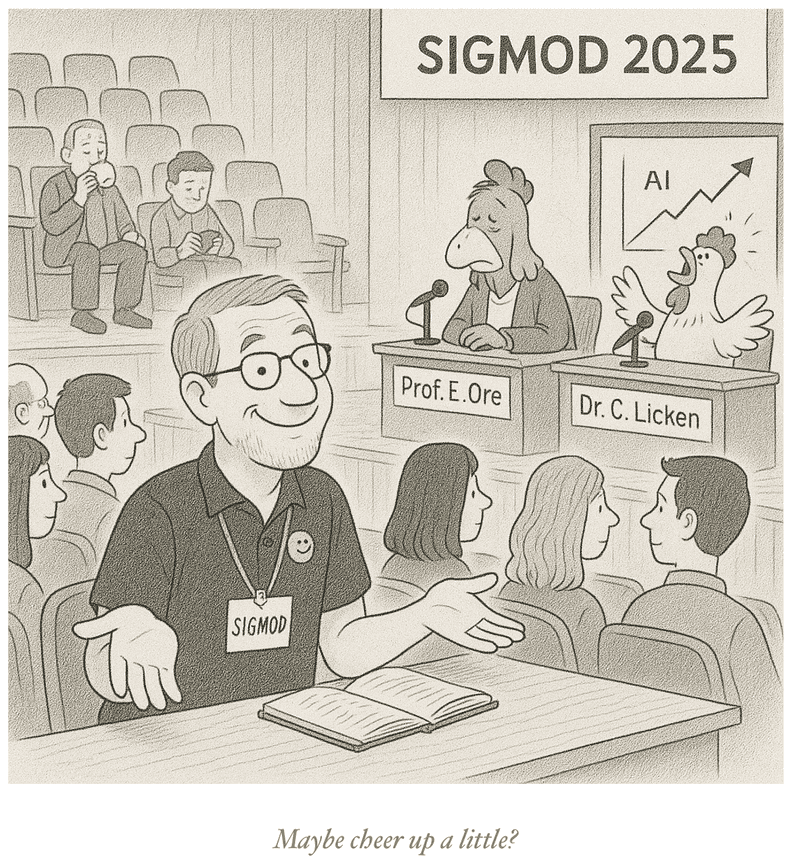I write this note on my way home from the annual ACM SIGMOD conference, one of the top venues for data management research. In this post I want to reflect on one of the best-attended sessions, a panel discussion that continued what I think is a sorry tradition of needless negativity for our burgeoning field.
Starting Positive
Before I get into that, though, let me say that in general I thought this year's conference was great! I am no doubt biased, having spent many many hours leading the program committee with my wonderful co-Chair and friend Azza Abouzied; I'd like to think that time was well spent. Also, numbers for submissions, acceptances, and even attendance were all way up this year—things continue to heat up despite the challenges with visas, geopolitics and funding.
Meanwhile, at the conference I got genuinely excited by new ideas on a bunch of occasions. Some of the papers this year seem to crack open big long-standing problems—especially in the area of Query Optimization, a longstanding interest of mine. We may be at a pivot point in that 50-year-old grand challenge!
On a personal level I actually find the hubbub of conferences a bit overwhelming, but they do get my brain juices
flowing. And it was good to see old friends, reinforce connections, and talk with new people. I also
had good fun playing the plastic cornet to mark the ends of the breaks. (Points to folks who
identify the names of some of the musical excerpts in the comments below!)
Another Eeyore Panel...Sigh
This year's SIGMOD, once again, featured a very well-attended, soul-searching (read: self-flagellating) panel on the direction and value of academic research in our field. The panel followed the form of a recurring shtick in our community: stirring discussion by positing a crisis of irrelevance.
Mike Stonebraker used to be the main culprit of these panels, trying to provoke conversation by saying things like "my VC friends think academic computer science is like a beached whale. Discuss." Mike is a hero, but I never thought this was one of his better leadership strategies—especially with respect to encouraging young people entering the field.
This year's panel was more diplomatically managed by two emerging leaders who I admire a lot, Eugene Wu and Raul Castro Fernandez. But the spirit and structure was familiar. Panelists were encouraged to make "provocative" assertions, which repeatedly included things like "data stakeholders don't want to buy what we're selling" and "database systems are already fast, so stop working on performance".
For both of these, at face value the answer is clearly "Duh... No!", with billions of dollars in revenue and cost-savings as evidence. Of course there was a kernel of nuanced useful advice in these statements ("be responsive to a wider variety of user needs", "we can focus on more topics than performance"), but it was buried in a pile of polemic hogwash encouraged by the format.
These panels frustrate me. They inject negativity and false narratives into the discourse in the name of being "provocative", and I get impatient because the time spent debating the foolishness could be devoted to far more constructive purposes.
Don't Worry, Be Happy! 🤠
For my young colleagues who work on data management research, here's the good news, and the truth: data management is an especially rich environment to build a career. To begin with, there are plenty of well-defined, important and challenging technical problems right in front of our noses. Many of these problems have clear economic benefit to established vendors, so you can find out about them pretty easily, and do work that gets quick recognition. Whether these are longstanding problems to be chipped away at, or perennial challenges that keep shifting with workloads or tech trends, there's no shortage of well-known topics where you can make your name and make a big difference.
Even better: from there, the upside potential is much higher. If history is any guide, there will be an ongoing stream of unexpected new directions in data management, many of which will be career-defining. As you gain confidence, go explore! Dream big! Think outside the box! Choose your cliche...the point is, in the data field the odds of outsized success are bigger than in most scientific and engineering disciplines. Frankly, we're spoiled with relevance and opportunity.
And to my senior colleagues let me say this: Enough with the Chicken-Licken-meets-Eeyore act. Spread some sunshine to the junior folks. To rattle off one more cliche: Lead, Follow or Get Out of the Way!
In the spirit of being constructive, in my next post I'll share some actionable ideas that I've found useful for choosing impactful and personally rewarding research.

